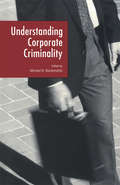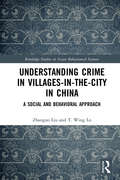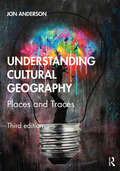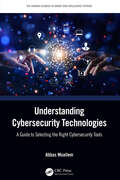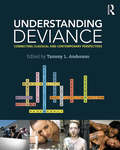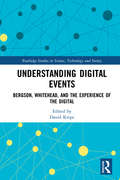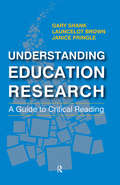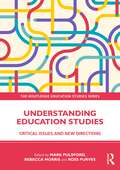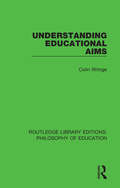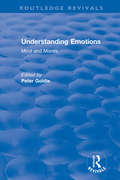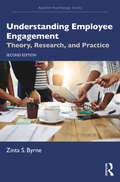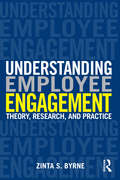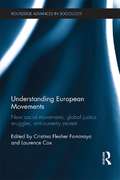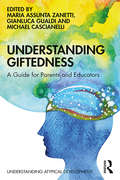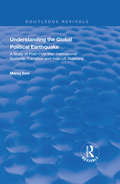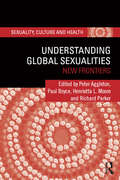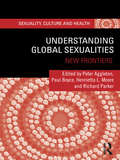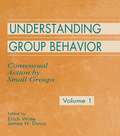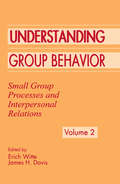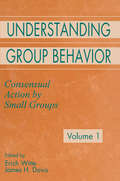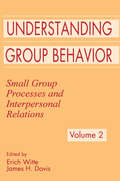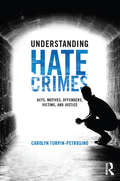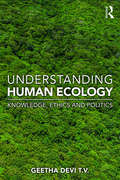- Table View
- List View
Understanding Corporate Criminality (Current Issues in Criminal Justice #Vol. 3)
by Michael B. BlankenshipFirst Published in 1995. Routledge is an imprint of Taylor & Francis, an informa company.
Understanding Crime in Villages-in-the-City in China: A Social and Behavioral Approach (Routledge Studies in Asian Behavioural Sciences)
by T. Wing Lo Zhanguo LiuRapid urbanization of economic zones in China has resulted in a special social phenomenon: "villages-in-the-city." Underdeveloped villages are absorbed during the expansion of urban areas, while retaining their rustic characteristics. Due to the rural characteristics of these areas, social security is much lower compared with the urbanized city. This book uses Tang Village, a remote area in the Shenzhen Special Economic Zone, as an example to establish a comprehensive analytical framework by integrating existing crime theories in analyzing villages-in-the-city. The analysis covers the community, individual, and macro levels to detail the diverse social and behavioral factors causing crime at multiple levels. First, a brief history of the urbanization process of Tang Village is provided to establish how urban planning contributed to the issues in the village today. The authors go on to explain how socially disorganized communities dictate the crime hotspots and the common types of crime. The book examines other risk factors that may contribute to the level of crime such as weak social controls, building density, and floating populations of poor working-class migrants. The routine activities of victims, offenders, and guardians are examined. The book concludes with the current trends in the social structure within the villages-in-the-city and their expected outcome after urbanization.
Understanding Cultural Geography: Places and Traces
by Jon AndersonThis book outlines how the theoretical ideas, empirical foci, and methodological techniques of cultural geography make sense of the ‘culture wars’ that define our time. It is on the battleground of culture that our opportunities, rights, and futures are determined and Understanding Cultural Geography showcases how this discipline can be used to understand these battles and how we can engage in them. Through doing so, the book not only introduces the reader to the rich and complex history of cultural geography, but also the key terms on which the discipline is built. From these insights, the text approaches place as an ‘ongoing composition of traces’, highlighting the dynamic and ever-changing nature of the world around us, and what our role can be in transforming it for the better. The third edition has been fully revised and updated to incorporate recent literature and reflect the changing cultural context of its time. Retaining its exciting and innovative structure, the third edition will expand its focus into new areas, including updated chapters on ethnicity and race, and new chapters on gender and the body. This new edition captures not only recent changes in the cultural world, but also the discipline itself, offering the most up-to-date text to understand and engage with the cultural battlegrounds which constitute our lives. Understanding Cultural Geography is the ideal text for students being introduced to the discipline through either undergraduate or postgraduate degree courses. The third edition is an important update to a highly successful text that incorporates a vast foundation of knowledge; it is an invaluable book for lecturers and students.
Understanding Cybersecurity Technologies: A Guide to Selecting the Right Cybersecurity Tools (The Human Element in Smart and Intelligent Systems)
by Abbas MoallemCyberattacks on enterprises, government institutions, and individuals are exponentially growing. At the same time, the number of companies, both small and large, offering all types of solutions has been increasing too. Since companies rely on technological solutions to protect themselves against cyberattacks, understanding and selecting the right solutions among those offered presents a significant challenge for professionals, company executives, and newcomers to the cybersecurity field.FEATURES Presents descriptions for each type of cybersecurity technology and their specifications Explains applications, usages, and offers case studies to enhance comprehension Offers an easy-to-understand classification of existing cybersecurity technologies Provides an understanding of the technologies without getting lost in technical details Focuses on existing technologies used in different solutions, without focusing on the companies that offer these technologies This book is intended to help all professionals new to cybersecurity, students, and experts to learn or educate their audiences on the foundations of the available solutions.
Understanding Deviance: Connecting Classical and Contemporary Perspectives (Sociology Re-Wired)
by Tammy L. AndersonIn this collection of 48 reprinted and completely original articles, Tammy Anderson gives her fellow instructors of undergraduate deviance a refreshing way to energize and revitalize their courses. [36 are reprints; 12 are original to this text/anthology] First, in 12 separate sections, she presents a wide range of deviant behaviors, traits, and conditions including: underage drinking and drunk driving, doping in elite sports, gang behavior, community crime, juvenile delinquency, hate crime, prison violence and transgendered prisoners, mental illness, drug-using women and domestic violence, obesity, tattooing, sexual fetishes, prostitution, drug epidemics, viral pandemics, crime control strategies and racial inequality, gay neighborhoods, HIV and bugchasers, and (lastly) youth, multicultural identity and music scenes. Second, her pairing of "classic" and "contemporary" viewpoints about deviance and social control not only "connects" important literatures of the past to today’s (student) readers, her "connections framework" also helps all of us see social life and social processes more clearly when alternative meanings are accorded to similar forms of deviant behavior. We also learn how to appreciate and interact with those who see things differently from ourselves. This may better equip us to reach common goals in an increasingly diverse and ever-changing world. Third, a major teaching goal of Anderson’s anthology is to sharpen students’ critical thinking skills by forcing them to look at how a deviant behavior, trait or condition, can be viewed from opposing or alternative perspectives. By learning to see deviance from multiple perspectives, students will better understand their own and other’s behavior and experiences and be able to anticipate future trends. Balancing multiple perspectives may also assist students in their practical work in social service, criminal justice and other agencies and institutions that deal with populations considered "deviant" in one way or another.
Understanding Digital Events: Bergson, Whitehead, and the Experience of the Digital (Routledge Studies in Science, Technology and Society)
by David KrepsThis book introduces an events-based approach to understanding digital experience. Focusing on the event-ontologies of Bergson and Whitehead’s process metaphysics, it explores subjective experience and objective reality as unified ‘events’ in the form of concrete slabs of existence. Such slabs are temporally defined by a term or period, in which all physical-chemical processes and personal subjective experience are included. Bringing together insights from a range of different specialisms, it urges us to consider a science of nature that includes both physical and non-physical realities and, from this ontological position, draws on philosophy, media, and user experience practice to provide a new account of the technological or virtual world of today. An examination of the manner in which process philosophy may be applied to contemporary digital experience, this volume will appeal to scholars of philosophy, science and technology studies and information systems.
Understanding Education Research: A Guide to Critical Reading
by Launcelot Brown Gary Shank Janice Pringle"Understanding Education Research" is designed to help students learn to read educational research articles carefully, systematically, and critically. Students learn to categorize titles, decode abstracts, find research questions, characterize research arguments, break down methods and procedures, explore references, apply analysis strategies, and interpret findings. The book allows them to easily develop the skills they need to be research literate. It offers simple guidelines for qualitative, quantitative, and statistical approaches that help students master the basics behind these often complex and confusing methodologies. The book is accessible for future researchers or for students who simply need to understand research clearly. It is written in a clear and engaging style, with ample concrete examples of each stage, offering exercises for student practice.
Understanding Education Studies: Critical Issues and New Directions (The Routledge Education Studies Series)
by Mark PulsfordThis book explores undergraduate education programmes in a new way. Written by those at the forefront of teaching and learning, it encourages students to delve beneath the surface of their degree subject and reveals important insights about the how, why and where next for education studies. With contributions from course leaders, tutors, current students and recent graduates, this book offers insights from nearly 60 authors based in 20 different institutions from five different countries. The chapters offer opportunities for readers to consider their own learning experiences in a wider context, enhance their understanding of the degree course and actively shape the education studies community of the future. Each chapter is written in an accessible way, with ‘questions to consider’ throughout and ‘recommended readings’ at the end to advance readers’ thinking and reflections. Chapters cover topics such as: Education Studies’ development as a degree subject Its evolving identity, values and purposes Teaching and assessment approaches in undergraduate education programmes How the subject develops students’ professional aptitudes and transferable skills Possibilities for advancing inclusion, equity and justice in education at degree level These ‘behind the scenes’ factors are brought to the fore through case studies and examples of how lecturers and students make sense of their teaching and learning. With its unique approach to examining these issues, this book is essential for students of Education Studies at undergraduate level while also being relevant for staff and postgraduate students in education.
Understanding Educational Aims (Routledge Library Editions: Philosophy of Education #21)
by Colin WringeThis text, first published in 1988, examines the underlying rationale of educational aims as applied to individual pupils, social policies and supposedly intrinsic values. This book explores traditional educational aims such as developing the potential and autonomy of individuals or the promotion of rationality as well as more contemporary and often controversial ones. The author provides a clear and balanced justification of educational aims which teachers need in order to combat the rhetoric of changing fashion or the pressures of political and managerial opportunism. This book is essential reading both for students and teachers.
Understanding Emotions: Mind and Morals (Routledge Revivals)
by Peter GoldieThis title was first published in 2002: At the end of the 20th century, the emotions ceased to be a neglected topic for philosophical consideration. The editor suggests that this may, in part, be due to a change in the way the subject is approached. The emotions were characteristically thought of by philosophers as states which give rise to perturbation in what might roughly be called "right-thinking". The basic idea was that practical reasoning, like theoretical reasoning, ought to be, and can be, dispassionate. This means that either the emotions interfere with "right-reasoning" in a way which is a proper object of study for the biological sciences but not for the science of the mind, or that the emotions become reducible to, and analyzable as, collections of propositional attitudes which are themselves assessable in terms of "right-reasoning". The move away from this idea is taken as an improvement in our philosophical approach to the emotions by the authors. Following this, all of the papers in the volume contribute to this philosophical approach, each approaching the subject from a different angle.
Understanding Employee Engagement: Theory, Research, and Practice (Applied Psychology Series)
by Zinta S. ByrneUnderstanding Employee Engagement is a comprehensive source for the science and practice of employee engagement. This book provides a rigorous and objective review of scholarship and empirical research on engagement from around the world. Grounded in theory and empirical research, this book debates the definitions of engagement, provides a thorough evaluation of empirical findings in the engagement field including a focus on international findings, and offers practice implications for organizations. The book is broad, with references and research across disciplines and countries, as well as new sections addressing current challenges, such as virtual engagement, engaging the aging workforce, and perspectives on diversity and inclusion. Employers can learn how to foster an engaged organization; practitioners can learn how to measure, identify, and implement evidence-based solutions to disengagement; and researchers can master the existing engagement literature and begin to study the many propositions and new models the author proposes throughout the book. This book is an essential read for scholars, researchers, practitioners, and business leaders alike for understanding how to measure, identify, and implement evidence-based solutions to foster employee engagement.
Understanding Employee Engagement: Theory, Research, and Practice (Applied Psychology Series)
by Zinta S. ByrneEmployee engagement is a novel concept that has been building momentum in recent years. Understanding Employee Engagement: Theory, Research, and Practice exposes the science and practice of employee engagement. Grounded in theory and empirical research, this book debates the definitions of engagement, provides a comprehensive evaluation of empirical findings in the engagement field including a focus on international findings, and offers implications for science and practice in organizations. Employers can learn how to foster and drive engagement to increase productivity and happiness, and researchers can master the existing engagement literature and begin to study the many propositions and new models Zinta S. Byrne, Ph.D. proposes throughout the book.
Understanding Employee Engagement: Theory, Research, and Practice (Applied Psychology Series)
by Zinta S. ByrneUnderstanding Employee Engagement is a comprehensive source for the science and practice of employee engagement. This book provides a rigorous and objective review of scholarship and empirical research on engagement from around the world. Grounded in theory and empirical research, this book debates the definitions of engagement, provides a thorough evaluation of empirical findings in the engagement field including a focus on international findings, and offers practice implications for organizations. The book is broad, with references and research across disciplines and countries, as well as new sections addressing current challenges, such as virtual engagement, engaging the aging workforce, and perspectives on diversity and inclusion. Employers can learn how to foster an engaged organization; practitioners can learn how to measure, identify, and implement evidence-based solutions to disengagement; and researchers can master the existing engagement literature and begin to study the many propositions and new models the author proposes throughout the book. This book is an essential read for scholars, researchers, practitioners, and business leaders alike for understanding how to measure, identify, and implement evidence-based solutions to foster employee engagement.
Understanding European Movements: New Social Movements, Global Justice Struggles, Anti-Austerity Protest (Routledge Advances in Sociology)
by Laurence Cox Cristina Flesher FominayaEuropean social movements have been central to European history, politics, society and culture, and have had a global reach and impact. Yet they have rarely been taken on their own terms in the English-language literature, considered rather as counterpoints to the US experience. This has been exacerbated by the failure of Anglophone social movement theorists to pay attention to the substantial literatures in languages such as French, German, Spanish or Italian – and by the increasing global dominance of English in the production of news and other forms of media. This book sets out to take the European social movement experience seriously on its own terms, including: the European tradition of social movement theorising – particularly in its attempt to understand movement development from the 1960s onwards the extent to which European movements between 1968 and 1999 became precursors for the contemporary anti-globalisation movement the construction of the anti-capitalist "movement of movements" within the European setting the new anti-austerity protests in Iceland, Greece, Spain (15-M/Indignados), and elsewhere. This book offers a comprehensive, interdisciplinary perspective on the key European social movements in the past forty years. It will be of interest for students and scholars of politics and international relations, sociology, history, European studies and social theory.
Understanding Giftedness: A guide for parents and educators (Understanding Atypical Development)
by Gianluca Gualdi Maria Assunta Zanetti Michael CascianelliThis concise, accessible guide explores the different models behind the concept of giftedness, examining the criteria for evaluating and identifying gifted children, in order to provide a deeper understanding of the lives of children and young people with high cognitive potential. It offers practical advice to parents and teachers, highlighting common queries and misconceptions and presenting evidence-based suggestions for management methods. Key topics covered include the difference between being gifted and talented, how to identify a gifted child, neurological differences between gifted children and their peers, dealing with perfectionism, and the best ways to parent and teach a gifted child. Avoiding prescriptive rules, the authors emphasise the importance of knowing and understanding the individual child whilst utilising research around giftedness to promote the best possible outcomes. Illustrated with case studies of student and teacher perspectives, the book offers an inclusive perspective and practical strategies, whereby the development of individual potential is viewed not only as a way to promote the psychological well-being of the individual but also as an opportunity and benefit for society. Understanding Giftedness is essential reading for parents and caregivers, as well as practitioners in clinical and educational psychology, counselling, mental health, nursing, child welfare, public healthcare and those in education who want to help young people develop their talents and achieve their full potential.
Understanding Global Political Earthquake: Study of Post-Cold War International Systemic Transition and Indo-US Relations (Routledge Revivals)
by Manoj SoniPublished in 1998, this text presents two theoretical frameworks for understanding the post-Cold War international systematic transition, and Indo-US relational patterns. The frameworks explain the casual determinants of the current international systematic transition and foreign policy in a comparative perspective. It aims to provide tools not only to gauge the present transition but also to develop warning systems to decipher symptoms of any future international systematic transition of foreign policy behaviour.
Understanding Global Sexualities: New Frontiers (Sexuality, Culture and Health)
by Richard Parker Henrietta L. Moore Peter Aggleton Paul BoyceOver the course of the past thirty years, there has been an explosion of work on sexuality, both conceptually and methodologically. From a relatively limited, specialist field, the study of sexuality has expanded across a wide range of social sciences. Yet as the field has grown, it has become apparent that a number of leading edge critical issues remain. This theory-building book explores some of the areas in which there is major and continuing debate, for example, about the relationship between sexuality and gender; about the nature and status of heterosexuality; about hetero- and homo-normativity; about the influence and intersection of class, race, age and other factors in sexual trajectories, identities and lifestyles; and about how best to understand the new forms of sexuality that are emerging in both rich world and developing world contexts. With contributions from leading and new scholars and activists from across the globe, this book highlights tensions or ‘flash-points’ in contemporary debate, and offers some innovative ways forward in terms of thinking about sexuality – both theoretically and with respect to policy and programme development. An extended essay by Henrietta Moore introduces the volume, and an afterword by Jeffrey Weeks offers pointers for the future. The contributors bring together a range of experiences and a variety of disciplinary perspectives in engaging with three key themes of sexual subjectivity and global transformations, sexualities in practice, and advancing new thinking on sexuality in policy and programmatic contexts. It is of interest to students, researchers and activists in sexuality, sexual health and gender studies, especially those working from public health, sociological and anthropological perspectives.
Understanding Global Sexualities: New Frontiers (Sexuality, Culture and Health)
by Richard Parker Henrietta L. Moore Peter Aggleton Paul BoyceOver the course of the past thirty years, there has been an explosion of work on sexuality, both conceptually and methodologically. From a relatively limited, specialist field, the study of sexuality has expanded across a wide range of social sciences. Yet as the field has grown, it has become apparent that a number of leading edge critical issues remain. This theory-building book explores some of the areas in which there is major and continuing debate, for example, about the relationship between sexuality and gender; about the nature and status of heterosexuality; about hetero- and homo-normativity; about the influence and intersection of class, race, age and other factors in sexual trajectories, identities and lifestyles; and about how best to understand the new forms of sexuality that are emerging in both rich world and developing world contexts. With contributions from leading and new scholars and activists from across the globe, this book highlights tensions or ‘flash-points’ in contemporary debate, and offers some innovative ways forward in terms of thinking about sexuality – both theoretically and with respect to policy and programme development. An extended essay by Henrietta Moore introduces the volume, and an afterword by Jeffrey Weeks offers pointers for the future. The contributors bring together a range of experiences and a variety of disciplinary perspectives in engaging with three key themes of sexual subjectivity and global transformations, sexualities in practice, and advancing new thinking on sexuality in policy and programmatic contexts. It is of interest to students, researchers and activists in sexuality, sexual health and gender studies, especially those working from public health, sociological and anthropological perspectives.
Understanding Group Behavior: Volume 1: Consensual Action By Small Groups
by James H. Davis Erich H. WitteThese books grew out of the perception that a number of important conceptual and theoretical advances in research on small group behavior had developed in recent years, but were scattered in rather fragmentary fashion across a diverse literature. Thus, it seemed useful to encourage the formulation of summary accounts. A conference was held in Hamburg with the aim of not only encouraging such developments, but also encouraging the integration of theoretical approaches where possible. These two volumes are the result. Current research on small groups falls roughly into two moderately broad categories, and this classification is reflected in the two books. Volume I addresses theoretical problems associated with the consensual action of task-oriented small groups, whereas Volume II focuses on interpersonal relations and social processes within such groups. The two volumes differ somewhat in that the conceptual work of Volume I tends to address rather strictly defined problems of consensual action, some approaches tending to the axiomatic, whereas the conceptual work described in Volume II is generally less formal and rather general in focus. However, both volumes represent current conceptual work in small group research and can claim to have achieved the original purpose of up-to-date conceptual summaries of progress on new theoretical work.
Understanding Group Behavior: Volume 1: Consensual Action By Small Groups; Volume 2: Small Group Processes and Interpersonal Relations
by James H. Davis Erich H. WitteThese books grew out of the perception that a number of important conceptual and theoretical advances in research on small group behavior had developed in recent years, but were scattered in rather fragmentary fashion across a diverse literature. Thus, it seemed useful to encourage the formulation of summary accounts. A conference was held in Hamburg with the aim of not only encouraging such developments, but also encouraging the integration of theoretical approaches where possible. These two volumes are the result. Current research on small groups falls roughly into two moderately broad categories, and this classification is reflected in the two books. Volume I addresses theoretical problems associated with the consensual action of task-oriented small groups, whereas Volume II focuses on interpersonal relations and social processes within such groups. The two volumes differ somewhat in that the conceptual work of Volume I tends to address rather strictly defined problems of consensual action, some approaches tending to the axiomatic, whereas the conceptual work described in Volume II is generally less formal and rather general in focus. However, both volumes represent current conceptual work in small group research and can claim to have achieved the original purpose of up-to-date conceptual summaries of progress on new theoretical work.
Understanding Group Behavior: Volume 1: Consensual Action By Small Groups; Volume 2: Small Group Processes and Interpersonal Relations
by James H. Davis Erich H. WitteThese books grew out of the perception that a number of important conceptual and theoretical advances in research on small group behavior had developed in recent years, but were scattered in rather fragmentary fashion across a diverse literature. Thus, it seemed useful to encourage the formulation of summary accounts. A conference was held in Hamburg with the aim of not only encouraging such developments, but also encouraging the integration of theoretical approaches where possible. These two volumes are the result. Current research on small groups falls roughly into two moderately broad categories, and this classification is reflected in the two books. Volume I addresses theoretical problems associated with the consensual action of task-oriented small groups, whereas Volume II focuses on interpersonal relations and social processes within such groups. The two volumes differ somewhat in that the conceptual work of Volume I tends to address rather strictly defined problems of consensual action, some approaches tending to the axiomatic, whereas the conceptual work described in Volume II is generally less formal and rather general in focus. However, both volumes represent current conceptual work in small group research and can claim to have achieved the original purpose of up-to-date conceptual summaries of progress on new theoretical work.
Understanding Group Behavior: Volume 1: Consensual Action By Small Groups; Volume 2: Small Group Processes and Interpersonal Relations
by James H. Davis Erich H. WitteThese books grew out of the perception that a number of important conceptual and theoretical advances in research on small group behavior had developed in recent years, but were scattered in rather fragmentary fashion across a diverse literature. Thus, it seemed useful to encourage the formulation of summary accounts. A conference was held in Hamburg with the aim of not only encouraging such developments, but also encouraging the integration of theoretical approaches where possible. These two volumes are the result. Current research on small groups falls roughly into two moderately broad categories, and this classification is reflected in the two books. Volume I addresses theoretical problems associated with the consensual action of task-oriented small groups, whereas Volume II focuses on interpersonal relations and social processes within such groups. The two volumes differ somewhat in that the conceptual work of Volume I tends to address rather strictly defined problems of consensual action, some approaches tending to the axiomatic, whereas the conceptual work described in Volume II is generally less formal and rather general in focus. However, both volumes represent current conceptual work in small group research and can claim to have achieved the original purpose of up-to-date conceptual summaries of progress on new theoretical work.
Understanding Hate Crimes: Acts, Motives, Offenders, Victims, and Justice
by Carolyn Turpin-PetrosinoHate crimes and lesser acts of bigotry and intolerance are seen to be constants in today’s world. Since 1990, the federal government has published annual reports on hate crime incidents in the United States. While the reported numbers are disturbing, even more devastating is the impact of these crimes on individuals, communities, and society. This comprehensive textbook can serve as a stand-alone source for instructors and students who study hate crimes and/or other related acts. It invites the reader to consider relevant social mores and practices as well as criminal justice policies as they relate to hate crimes by presenting this subject within a broad context.
Understanding Human Ecology: Knowledge, Ethics and Politics
by Geetha Devi T. V.This book examines the domain of human agency–environment interaction from a multidimensional point of view. It explores the human–environment interface by analysing its ethical, political and epistemic aspects – the value aspects that humans attribute to their environment, the relations of power in which the actions and their consequences are implicated and the meaning of human actions in relation to the environment. The volume delineates the character of this domain and works out a theoretical framework for the field of human ecology. This book will be a must-read for students, scholars and researchers of environmental studies, human ecology, development studies, environmental history, literature, politics and sociology. It will also be useful to practitioners, government bodies, environmentalists, policy makers and NGOs.
Understanding Human Resource Development: A Research-based Approach (Routledge Studies in Human Resource Development)
by Jim Stewart Jim McGoldrick Sandra WatsonThis edited volume contains original chapters by some of the leading researchers and writers in HRD. It provides a definitive work on the design and conduct of research in HRD and identifies and examines the possibilities and limitations of particular methods and techniques. Emerging debates on the purpose, nature and practice and theoretical base of HRD are examined. Each chapter is structured with: * Statement of aims* Description of theoretical and empirical context^* Identification and examination of methodological issues* Description and evaluation of research design* Critical analysis and evaluation* Key learning points
